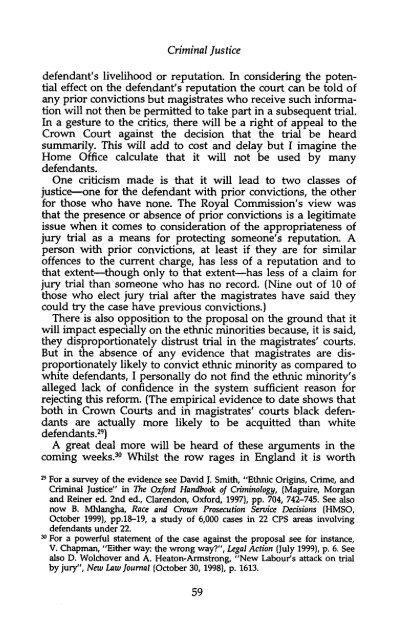HAMLYN - College of Social Sciences and International Studies ...
HAMLYN - College of Social Sciences and International Studies ...
HAMLYN - College of Social Sciences and International Studies ...
You also want an ePaper? Increase the reach of your titles
YUMPU automatically turns print PDFs into web optimized ePapers that Google loves.
Criminal Justice<br />
defendant's livelihood or reputation. In considering the potential<br />
effect on the defendant's reputation the court can be told <strong>of</strong><br />
any prior convictions but magistrates who receive such information<br />
will not then be permitted to take part in a subsequent trial.<br />
In a gesture to the critics, there will be a right <strong>of</strong> appeal to the<br />
Crown Court against the decision that the trial be heard<br />
summarily. This will add to cost <strong>and</strong> delay but I imagine the<br />
Home Office calculate that it will not be used by many<br />
defendants.<br />
One criticism made is that it will lead to two classes <strong>of</strong><br />
justice—one for the defendant with prior convictions, the other<br />
for those who have none. The Royal Commission's view was<br />
that the presence or absence <strong>of</strong> prior convictions is a legitimate<br />
issue when it comes to consideration <strong>of</strong> the appropriateness <strong>of</strong><br />
jury trial as a means for protecting someone's reputation. A<br />
person with prior convictions, at least if they are for similar<br />
<strong>of</strong>fences to the current charge, has less <strong>of</strong> a reputation <strong>and</strong> to<br />
that extent—though only to that extent—has less <strong>of</strong> a claim for<br />
jury trial than someone who has no record. (Nine out <strong>of</strong> 10 <strong>of</strong><br />
those who elect jury trial after the magistrates have said they<br />
could try the case have previous convictions.)<br />
There is also opposition to the proposal on the ground that it<br />
will impact especially on the ethnic minorities because, it is said,<br />
they disproportionately distrust trial in the magistrates' courts.<br />
But in the absence <strong>of</strong> any evidence that magistrates are disproportionately<br />
likely to convict ethnic minority as compared to<br />
white defendants, I personally do not find the ethnic minority's<br />
alleged lack <strong>of</strong> confidence in the system sufficient reason for<br />
rejecting this reform. (The empirical evidence to date shows that<br />
both in Crown Courts <strong>and</strong> in magistrates' courts black defendants<br />
are actually more likely to be acquitted than white<br />
defendants. 29 )<br />
A great deal more will be heard <strong>of</strong> these arguments in the<br />
coming weeks. 30 Whilst the row rages in Engl<strong>and</strong> it is worth<br />
29 For a survey <strong>of</strong> the evidence see David J. Smith, "Ethnic Origins, Crime, <strong>and</strong><br />
Criminal Justice" in The Oxford H<strong>and</strong>book <strong>of</strong> Criminology, (Maguire, Morgan<br />
<strong>and</strong> Reiner ed. 2nd ed., Clarendon, Oxford, 1997), pp. 704, 742-745. See also<br />
now B. Mhlangha, Race <strong>and</strong> Crown Prosecution Service Decisions (HMSO,<br />
October 1999), pp.18-19, a study <strong>of</strong> 6,000 cases in 22 CPS areas involving<br />
defendants under 22.<br />
30 For a powerful statement <strong>of</strong> the case against the proposal see for instance,<br />
V. Chapman, "Either way: the wrong way?", Legal Action (July 1999), p. 6. See<br />
also D. Wolchover <strong>and</strong> A. Heaton-Armstrong, "New Labour's attack on trial<br />
by jury", New Law Journal (October 30,1998), p. 1613.<br />
59

















